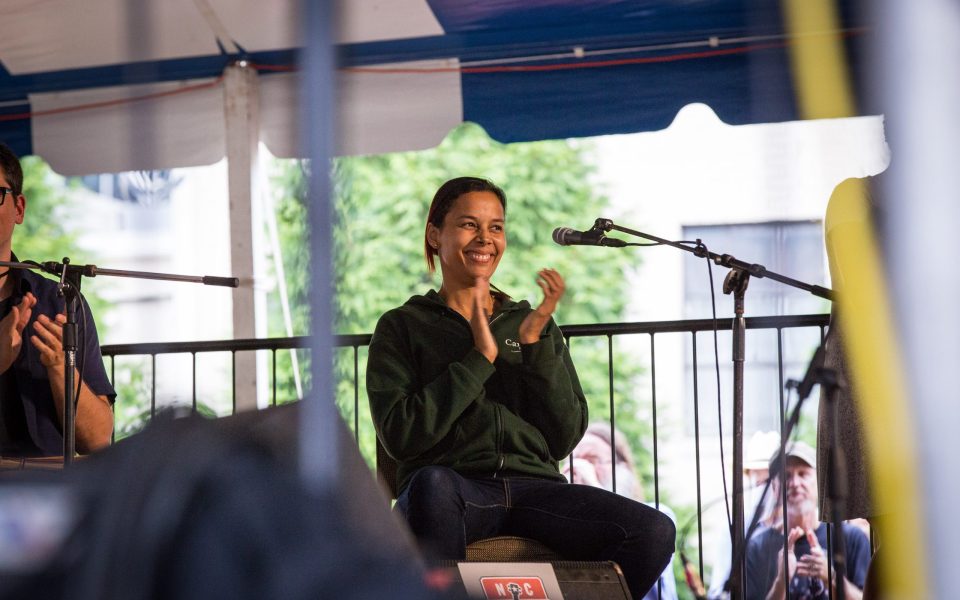“Don’t worry, I’m not gonna get into it; y’all know I can talk,” Rhiannon Giddens admits from an open-air stage in the heart of Greensboro, a smirk flashing across her face. “I’m just gonna play some tunes for ya.”
The prodigious singer-songwriter, multi-instrumentalist and co-founder of the Grammy Award-winning African-American string band Carolina Chocolate Drops is performing live with her band at the inaugural North Carolina Folk Festival, a locally-produced “legacy event” of the National Folk Festival, which moved on from Greensboro after last year. Giddens had performed at the first festival in her hometown hosted in 2015. Like the annual national festival, the three-day outdoor event featured an impressively diverse lineup of musicians, dancers and craftspeople in a celebration of cultural heritage traditions.
As a woman born to a white father and Native American and African-American mother in the late 1970s, she’s not afraid to make statements about her own roots, or make her mostly-white fan base a little uncomfortable. Her 2017 album Freedom Highway opens with “At the Purchaser’s Option,” a disquieting song inspired by a 1830s advertisement for a slave woman whose 9-month-old baby could be incorporated in her sale “at the purchaser’s option.”
Cool gusts of wind moving in from the east carry those and other haunting lyrics inspired by slave narratives toward an audience that spilled well beyond the white folding chairs in the Lincoln Financial parking lot. Few of the hundreds left their seats. The opera-trained singer’s exquisite vocals deserved that unwavering attention, whether crooning early 19th Century folk and gospel songs like “Wayfaring Stranger” or revealing her full prowess while belting the heights of a self-composed chorus.
Giddens says her career in traditional American music began when she found her place in Greensboro’s old-time and contra-dance communities.
“I heard some amazing old-time music at those dances and fell in love with the banjo and the rest is history,” she tells the audience between songs as a train’s call can be heard as it chugs through downtown.
“The whole idea of what we’re doin’ [at the festival] is trying to educate through music and trying to widen the knowledge base of some of these beloved art forms because the more we know about them, the more interesting they get,” Giddens says from the stage. “It’s not just about flashy steps; it’s about knowing where they come from and how they connect us to our past moving into the future.”
Last year, Giddens received a MacArthur Foundation Fellowship, also known as a “genius” grant, for her advocacy for traditional string music and work reclaiming African-Americans’ distinct contributions to folk and country music. She’s curated programming on these themes for this year’s event.
Her slate includes jazz and folk music performances fused with spoken word and dance, talks on banjo cultures and traditions, flat-footing and tap-dance workshops, a dance-off and, of course, her own voice.[pullquote]Learn more at ncfolkfestival.com and rhiannongiddens.com. [/pullquote]
Gearing up for a mid-show fiddle set, she massages her bow with resin as she pays a tribute to Joe Thompson, an African-American old-time fiddler credited with keeping the tradition of the black string band, which preludes blues, alive until his death at age 93 in 2012. Giddens is dedicated to tracing and honoring musical, cultural and blood lineages which are just as much about the present as the past. Toward the end of the evening, she invites her nephew Justin Harrington to the stage to rap his verses on “Better Get it Right the First Time,” a funky, soulful song she wrote in response to police violence. In it, she begs the question, “Did you stand your ground?… Is that why they took you down?”
“This song came out of [Justin] and I talkin’ about some of the stuff that’s been goin’ on, and that’s been goin’ on for a long time, but we’re becoming more and more aware of it,” she says on stage. “So this is about some of the things he faces as a young black man.”
Her sister, Lalenja Harrington of Greensboro, also joins Giddens on vocals for several songs, including the Staple Singers’ “Freedom Highway,” the evening’s finale. When Giddens claps her hands overhead, her audience overwhelmingly obliges in kind. With a final twirl of her butterscotch-orange skirt dotted with brilliant red blossoms, a final brandishing of her tambourine, her homecoming comes to a close.
Earlier, she’d said, “There’s been a lot of division in our country. I know in our hearts we want to believe each other and hear each other and to understand where we come from…. We gotta all fix our stuff together if we’re gonna fix anything.”
The night’s patchwork of the vast, messy American family had done the first step of work: They showed up and, hopefully, listened between the lines, grappling with an unsavory history and healing, one foot-stomping fiddle tune at a time.
Join the First Amendment Society, a membership that goes directly to funding TCB‘s newsroom.
We believe that reporting can save the world.
The TCB First Amendment Society recognizes the vital role of a free, unfettered press with a bundling of local experiences designed to build community, and unique engagements with our newsroom that will help you understand, and shape, local journalism’s critical role in uplifting the people in our cities.
All revenue goes directly into the newsroom as reporters’ salaries and freelance commissions.


Leave a Reply